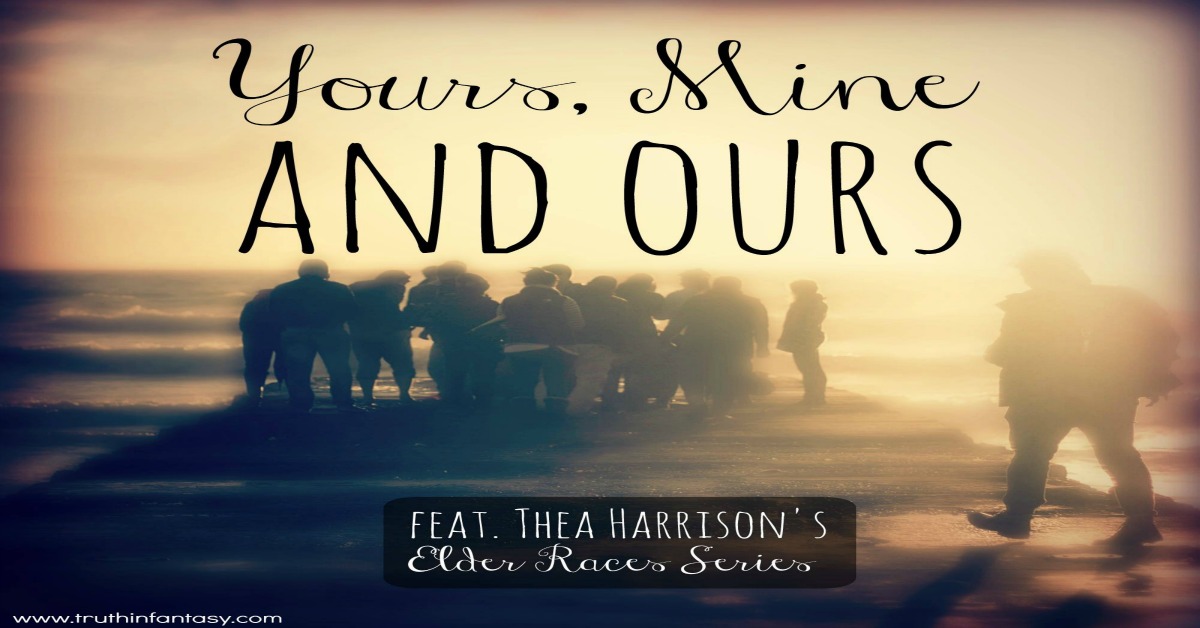I'm still enjoying a return visit with Thea Harrison's Elder Races. I'm currently re-reading Book 3, Serpent's Kiss, which focuses on the First Sentinel, Rune, who is a gryphon (half eagle, half lion, all sexy—in his human form). Anyway, in the book, Rune must fulfill an obligation, which he does, and then decide whether to involve himself in a more complex problem to help a friend. I've written about this issue before here, wondering whether the ability to do something creates an obligation to do so. Today my question is a bit different, and involves the line between what's mine to do, what belongs to someone else, and where the Divine fits into the equation. I've always liked the adage that we should pray like it all depends on God and work like it all depends on us. This saying can be modified in a few ways. First, if the concept of God is uncomfortable, the ideas of fate, luck or the Universe work too. Secondly, the whole thing works if we understand it entirely in the mundane realm—where we can rely on others—not the Divine—while simultaneously putting forth our best effort.
This is a complex and abstract concept and the whole thing tends to get very muddled in my mind. What to do? Turn to the genius of Dr. Seuss, of course, who tells us that all of life is a great balancing act. I am constantly wondering how much I need to do, how much I need to turn over, when to ask for help, when to hold on and when to let go. In Thea Harrison's book, when Rune decides to stay and help, it turns out that his actions have far-reaching consequences. This is often true for us as well. There are so many nuances in making decisions and taking action. The whole thing can paralyze me.
I believe that God helps those who help themselves and that the harder I work, the luckier I get. I have never been one to stand around hoping or expecting that what I want will magically fall in my lap. In my experience, that doesn't usually happen, although serendipity is a beautiful angel who occasionally lands on my shoulder and offers her bounty. But I don't think we can count on that. On the other hand, it's also important to make sure we are exploiting opportunities when they present themselves. Sometimes they are easy to miss if we aren't paying attention, as I’ve written about before here. Sometimes the bush is seriously on fire.
I love the story about the guy trapped on a rooftop during a flood. A raft, a boat and a helicopter come by and offer assistance, which he refuses, saying the Lord will save him. When he dies and stands before the Lord, the man asks God why he wasn't saved and God replies, "I sent a raft, a boat and a chopper, why didn't you use them?" Which adds another level of complexity to my rumination about what is for me to do, when to accept help, and when to surrender altogether. So confusing.
I guess if it's impossible to find the line, we just need to keep dancing, stepping lightly all around, hoping we don't step on too many cracks. I'd hate to break my mother's back, after all. I'll go with the idea that everything depends on me and act as if it does. But I'll also put in my time on my knees and continue to ask the Divine for help. I'll take assistance anywhere I can get it.
So whether it's yours, mine or ours to do, and whether the Universe will deign to intervene in a positive way (or possibly to our detriment), I've always got to do my bit like everything depends on it. If I'm really not sure if it's mine to do, or best left for others to carry the water, a little discernment is in order. I think there are basically two types of people in these situations: those who tend to walk on by and those who tend to make like Atlas, with the responsibility for everything resting on their shoulders. I'm in the Atlas category, and if I'm not careful, I can be my own worst enemy. I have to think twice before I decide something is mine to do, because my tendency is to get my exercise jumping to conclusions that it's always all up to me. For others, the opposite may be true, and for those folks, the right answer might be to say yes more often than they are inclined to do.
In any case, it's important not to assume, and to do our due diligence concerning where our obligations—those we choose and those we have thrust upon us—reside. Yours, mine, ours, God's? These are the questions of a well-lived life. My thanks to Thea Harrison for helping me to sort out some of the answers, or at least to make sure I continue to ask the questions.

